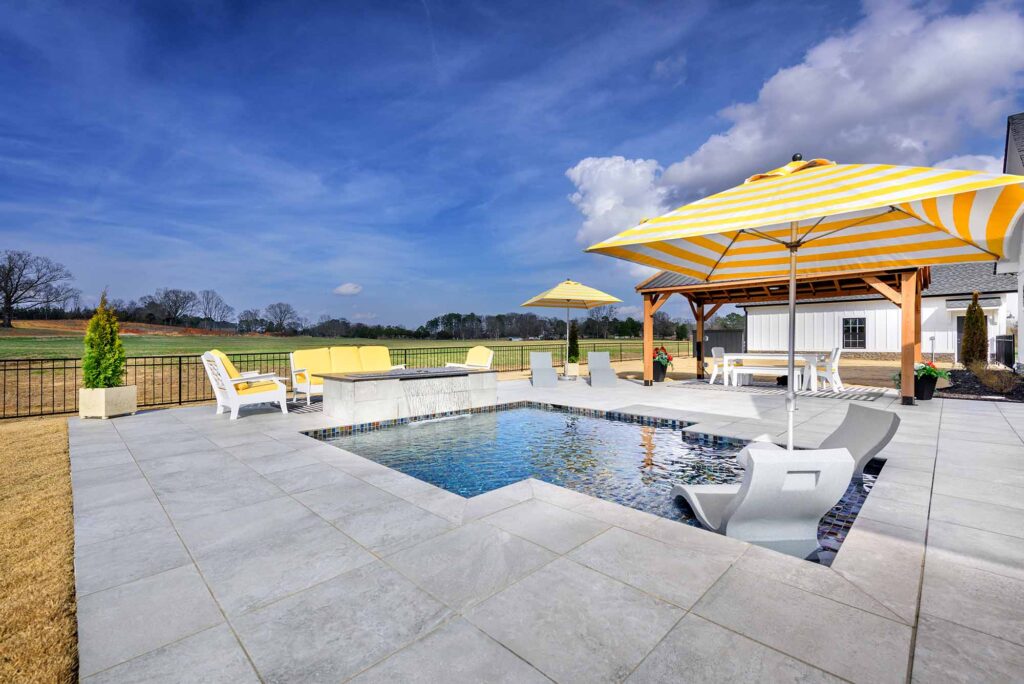Saltwater vs Chlorine vs Magnesium Pools: What is the difference?
Are you having trouble deciding between a chlorine, saltwater, or magnesium pool? You’re not alone!
Saltwater and magnesium pool systems have gained popularity in recent years, and as a result, pool owners are starting to wonder if their chlorine pool systems are becoming a thing of the past.
But, while there are some advantages to saltwater and magnesium pools, there are also plenty of reasons why chlorine pools are still the best choice for anyone looking for a reliable and cost-effective pool system.
To settle this debate, we’re exploring some key differences between these two pool systems – as well as little information on magnesium pools.
What is a chlorine pool?
Chlorine pools are the most common and trusted pool systems on the market. They’re also the easiest to operate. A chlorine system distributes chlorine throughout your pool, maintaining a proper chemical balance and preventing bacterial growth.
Chlorine tablets can be added by hand, or with the aid of a floating chlorine dispenser. As long as the proper chemical balance is maintained, your pool water will stay healthy and safe to swim in.
What is a saltwater pool?
Contrary to what the name implies, saltwater pools also use chlorine to maintain water health. Once salt is added to the pool, a unit called a salt chlorinator converts the salt crystals into chlorine gas.
While the concentration of chlorine isn’t as high in saltwater pools, salt does not evaporate with water. Instead, it lingers in the pool, supplying a continual source of chlorine. This means a saltwater pool’s chemical balance requires less monitoring as time goes on.
What is a magnesium pool?
A magnesium pool is an increasingly popular choice among homeowners seeking a natural and gentle swimming experience. Unlike traditional chlorine or saltwater pools, a magnesium pool utilizes magnesium mineral salts to help keep the water clean.
This pool type offers unique health benefits and a softer feel, as magnesium is known to soothe skin and muscles. Because it uses natural minerals, a magnesium pool is often gentler on the skin and eyes, providing a luxurious and spa-like swimming experience that’s particularly appealing for people with sensitive skin or allergies.

What is the difference between a saltwater pool, a chlorine pool, and a magnesium pool?
When deciding between saltwater, chlorine, and magnesium pools, it’s essential to consider how each pool is treated and the experience it provides.
- Chlorine Pools are the traditional choice, relying on chlorine to sanitize the water and kill bacteria. Chlorine pools are effective in maintaining clear water but can sometimes lead to strong smells and cause irritation to the skin and eyes.
- Saltwater Pools use salt chlorine generators to convert salt into chlorine, maintaining water quality with fewer harsh chemicals. While saltwater pools produce chlorine, the levels are typically lower than traditional chlorine pools, making them gentler overall.
- Magnesium Pools stand out by using magnesium chloride, a mineral that offers therapeutic benefits and creates a silky water feel. Unlike chlorine and saltwater pools, magnesium pools tend to have a softer, more natural water quality, which may be less likely to cause skin and eye irritation.
This type of pool also helps in reducing the use of common pool chemicals, as magnesium’s natural properties can assist in balancing water pH and enhancing clarity.
Installation Cost
The cost of installing any type of pool will vary depending on factors such as:
- The shape of the pool
- The size of the pool
- Materials used
- Custom features
But the cost of the pool system is one of the biggest expenses to consider.
- Chlorine pools often have the lowest initial installation cost, as they don’t require special equipment beyond standard chlorine feeders.
- Saltwater pools involve slightly higher installation costs due to the salt chlorine generator, which requires professional setup and calibration.
- Magnesium pools are typically the most expensive to install among these three options. Magnesium systems often require additional mineral converters or filtration systems to manage magnesium levels effectively. The extra installation requirements can increase the initial investment, but many homeowners find that the therapeutic benefits and the gentler, luxurious water experience justify the cost.
Considering the availability and price range of chlorine pool system parts, it’s no wonder these pools are more budget-friendly.
Maintenance
Chlorine pools require routine maintenance to stay crystal clear and bacteria-free.
As the water level in your pool fluctuates due to factors like evaporation and rain, you’ll need to balance your chlorine levels accordingly to maintain the proper pH. Chlorine tablets can be bought cheaply in bulk and pH test strips are available almost anywhere pool supplies are sold.
We recommend checking your pool’s pH once a week to stay ahead of chemical imbalances.
While the chlorine level of a saltwater pool won’t fluctuate as much and will require less continual upkeep, there are other factors to consider:
- Saltwater systems accumulate calcium that can damage the system if not cleaned out periodically
- Over time, saltwater will corrode metal system components, leading to costly repairs
- Saltwater systems require specialized service, even for minor issues, resulting in higher maintenance bills.
Magnesium pools generally have a slightly lower maintenance demand, as magnesium naturally helps to stabilize water chemistry and reduce algae growth. However, owners should still test magnesium levels periodically to ensure they stay within recommended ranges.
Magnesium pool systems may also need occasional mineral top-ups, but many users find that the water quality remains clearer and balanced with less effort than traditional chlorine pools.
When it comes to any pool system, occasional maintenance is expected. Fortunately, the team at Burleson Pool Company can help you with that! Our pool experts will quickly diagnose any issues and make the necessary repairs to get your pool working properly within your budget.
If you’re considering a chlorine pool installation in Alabama or Tennessee, reach out to the pool professionals at Burleson Pools today for a consultation.




